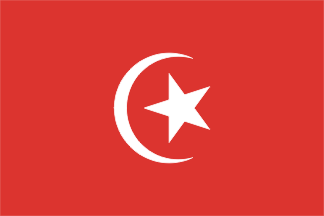![[Flag of Egypt in XIXth century?]](../images/e/eg-19c.gif) image by Mario Fabretto
image by Mario Fabretto
Last modified: 2011-06-07 by ian macdonald
Keywords: ottoman | khedive | crescent (white) | crescents: 3 | star: 7 points (white) | stars: 3 (white) | mameluk |
Links: FOTW homepage |
search |
disclaimer and copyright |
write us |
mirrors
See also:
The knowledge of old Turkish flags isn't very clear even if we know
that a lot of flags were used. This flag is quite common on flag
books and charts from the middle of 18th century and until the middle
of the 19th century. Among them I remember Norie and Hobbs (1848)
[noh48], Rosenfeld (1883),
Flaggen Almanack (ca. 1844). The flag didn't appear on
Le Gras (1858) so I think that its use ended in
the first half of the 19th century. The only thing we can say is that flags with
many stripes and irregular shape were quite common for the merchant ships
sailing from north African ports.
From many captured flags we also know that similar flags were used on
land also, but with different colors and arrangements. The particular
use of them is obscure.
Mario Fabretto, 13 July 1997
I read that the green, yellow, green triband is the traditional
flag of the Mameluks. The Mameluks were defeated by Bonaparte (1798),
but came back after some years (1808) and were again defeated and
massacred by Mehmed Ali (1 March 1811). The greater part of the
Mameluks were ethnical Cherkess.
Jaume Ollé, 9 July 1997
I found in my old (1884) atlas:
Egypt: Horizontal tricolor with three equal stripes green, yellow,
green.
Josh Fruhlinger, 11 May1996
![[Flag of Egypt in 1711 book]](../images/e/eg_1711.gif) image by Tomislav Todorovic, 22 December 2008
image by Tomislav Todorovic, 22 December 2008
In the flag chart created by Dutch cartographer Pieter Schenk in 1711, which
was published in the atlas by Guillaume Delisle of France in 1730 (reissued in
1739 as the "Nouvel atlas" by Covens & Mortier of Amsterdam), Egypt is
represented by a green-yellow-green horizontal triband, which is titled "Mamelik".
This "Mamluk" flag is grouped with those of the Ottoman Empire, reflecting the
then political status of Egypt. It is obviously the predecessor of the similar
flag of Egypt from the 19th century, from which it differs by simpler shape.
Source: Allen, Phillip, The Atlas of Atlases, London: Bounty Books, 2005,
ISBN-13 978-0-7537-1311-2
Tomislav Todorovic, 22 December 2008
The "Egyptian" flag, from a copy of People's Atlas of the
World published in April 1899 (almost exactly 100 years ago) by
Mast, Crowell & Kirkpatrick of Springfield, Ohio. The very first
page is a color chart of "Flags of Various Nations".
Chris Young, 26 March 1999
![[Flag of Egypt before 1889?]](../images/e/eg!19red.gif) image by António
Martins-Tuválkin, 18 September 2006
image by António
Martins-Tuválkin, 18 September 2006
On page https://www.gfg.com/19th/ is
a nice collection of national flags, US states and territories, city flags and
naval flags. These are the Allen & Ginter's
Cigarette Cards, nos. 9, 10, 11 and 17. Most are as expected for
contemporary information, and allow us to date the series as not-earlier-than
1885 and perhaps even 1889. The flag for Egypt is a red flag with a white
crescent pointing to the fly.
António Martins-Tuválkin, 18 September 2006
All 50 Player's cigarettes 1905 cards of the series "Countries
Arms & Flags" are on line at
http://digitalgallery.nypl.org. For Egypt, it shows an Ottoman flag (but
with a five-pointed star in the coat of arms):
http://digitalgallery.nypl.org/.
António Martins-Tuválkin, 22 February 2007
![[Flag of Egypt in 1858 flag chart]](../images/e/eg_1858.gif) image by António
Martins-Tuválkin, 8 September 2008
image by António
Martins-Tuválkin, 8 September 2008
Published in A Chart of
National Flags (1858), a plain green flag with a white smallish
(half-height) “banana”-style crescent.
António
Martins-Tuválkin, 8 September 2008
"The Ottoman flag in the XIXth century normally bore a white star
and crescent on its red field."
Quoted from Whitney Smith
[smi75c] by Nick
Artimovich, 23 April 1996
 image by Martin Grieve,
11 January 2008
image by Martin Grieve,
11 January 2008
Page 73 of Flags of Maritime Nations shows
the Egyptian flag at that time, but I was lead to believe that this was
essentially the Turkish flag (Smith
1975). There is a distinct difference in the design of the devices which are
centrally positioned on a 2:3? flag. This appears to be deliberate as the
Turkish flag from the same source is the same as today's contemporary version,
or so it would seem at a glance.
Martin Grieve, 11 January 2008
"Muhammad Ali did introduce one distinctive new flag which eventually became the first real Egyptian national flag. Perhaps to symbolize the victory of his armies in 3 continents (Europe, Asia, and Africa) or his own sovereignty over Egypt, Nubia, and the Sudan, Ali set three white crescents and three stars on a red field. (...) In 1882, Egyptian nationalists, seeking to take leadership in their own land by deposing the khedive, provided the pretext Britain sought for occupying the country. A promise was made that Her Majesty's troops would leave "as soon as the state of the country and the organization of proper means for the maintenance of the Khedivial authority will admit of it. "
Quoted from Whitney Smith [smi75c] by Nick Artimovich, 23 April 1996
This flag was the personal standard of the Khedive.
Josh Fruhlinger, 13 February 1996
The red flag with three crescents and stars, may have had a wider use than purely by the Khedive. I believe Kitchener's 1898 Anglo-Egyptian expedition to the Sudan carried it (along with the Union Jack of course!)
Roy Stilling, 14 February 1996